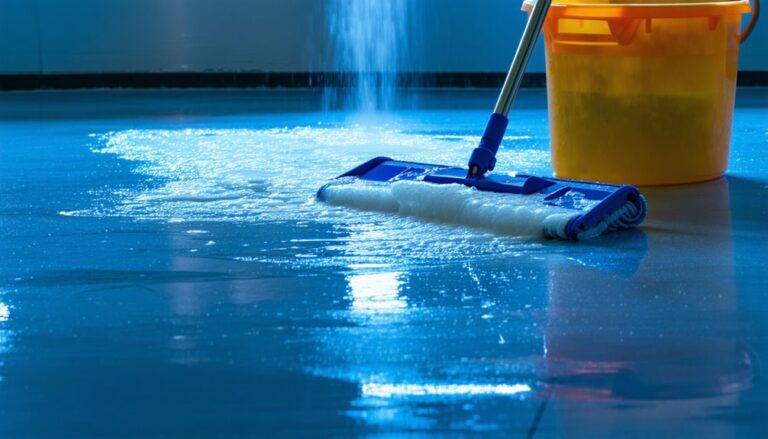Los perros lamen el suelo por diversas razones, desde comportamientos instintivos hasta respuestas emocionales. Su agudo olfato los impulsa a explorar su entorno, captando olores o restos de comida. También podrías notar este comportamiento cuando tu perro busca atención o se siente ansioso, ya que lamer puede servir como un mecanismo de consuelo. A veces, es señal de que busca ciertos nutrientes o tiene problemas de salud que deben abordarse. Comprender estas motivaciones puede fortalecer el vínculo. Descubre más sobre el comportamiento de tu cachorro y cómo podría afectar su bienestar general.
Instintos y comportamientos naturales

Si bien puede resultarle desconcertante cuando su perro lame el pisoEste comportamiento suele provenir de sus instintos naturales y comportamientos innatos. Los perros son buscadores instintivos, y lamer superficies podría ser un remanente del comportamiento de búsqueda de alimento de sus antepasados, donde buscaban alimento y evaluaban su entorno. Al lamer, tu perro podría estar recopilando información sensorial sobre su entorno, incluso si no hay comida. Además, los perros marcan su territorio de diversas maneras, y lamer podría servirles para dejar su olor en el suelo. Comprender estos comportamientos te ayudará a apreciar los impulsos naturales de tu perro y te permitirá abordar sus necesidades con mayor empatía, fomentando un vínculo más profundo entre tú y tu compañero canino.
Atracción del gusto y el olfato
Cuando tu perro lame el suelo, suele reflejar su gran atracción por el gusto y el olfato. Los perros poseen un olfato extraordinario, estimado entre 10.000 y 100.000 veces más sensible que el nuestro. Al lamer superficies, detectan partículas o restos de comida, lo que puede despertar su curiosidad y su comportamiento instintivo. Además, el interés de tu perro podría provenir de las marcas de olor dejadas por otros animales o incluso personas, creando un rico tapiz de olores que le fascinan. Este comportamiento no se debe simplemente al hambre; es una forma de que tu perro explore su entorno y conecte con él. Comprender esto puede ayudarte a apreciar sus instintos naturales, a la vez que garantizas su salud y seguridad.
Acciones para llamar la atención

Los perros suelen expresar su curiosidad lamiéndose, pero este comportamiento también puede ser una forma de llamar la atención de sus humanos. Cuando tu perro lame el suelo, podría estar intentando conectar contigo, creando un vínculo que fortalece la conexión emocional. Este instinto natural puede llevar a comportamientos de búsqueda de atención, ya que aprenden que lamer provoca una respuesta en ti.
| Tipo de comportamiento | Posibles causas | Resultado deseado |
|---|---|---|
| Lamiendo el suelo | Búsqueda de atención | Mayor interacción |
| Manoseándote | Curiosidad | Compromiso y tiempo de juego |
| Ladrido | Solicitud de atención | Reconocimiento o tiempo de juego |
Reconocer estas señales puede profundizar su relación, permitiendo una compañía más satisfactoria y liberada.
Respuestas al estrés y la ansiedad
Lamer el suelo también puede ser un mecanismo de defensa para los perros que experimentan estrés o ansiedad. Ante desencadenantes de comportamiento, como ruidos fuertes o entornos desconocidos, tu perro puede recurrir a este comportamiento para tranquilizarse. Es un reflejo de su estado emocional, lo que indica que podría necesitar tu apoyo.
A continuación se presentan algunos factores comunes que podrían provocar este comportamiento de lamido:
- Cambios en el hogar, como nuevas mascotas o personas.
- Ansiedad por separación cuando los dejas solos
- Factores estresantes ambientales, como tormentas eléctricas
Comprender estos mecanismos de afrontamiento puede ayudarle a crear un ambiente más reconfortante para su perro, permitiéndole sentirse seguro y libre de ansiedad. Observar su comportamiento es clave para apoyar su bienestar emocional.
Preocupaciones de salud a considerar

Si bien el estrés y la ansiedad pueden llevar a los perros a lamer el suelo, también existen importantes problemas de salud. Por ejemplo, las deficiencias dietéticas pueden provocar comportamientos inusuales, como el lamido excesivo. Si su perro carece de nutrientes esenciales, podría buscar instintivamente minerales o sabores en el suelo. Además, los comportamientos compulsivos pueden manifestarse como lamidos repetitivos, lo que puede indicar problemas médicos subyacentes o trastornos del comportamiento. Es importante observar la salud general y los hábitos de su perro. Si nota lamidos persistentes junto con cambios en el apetito o los niveles de energía, es necesario consultar con un veterinario. Abordar estos problemas a tiempo puede ayudar a proteger el bienestar de su perro y a recuperar su espíritu natural y despreocupado.
Preguntas frecuentes
¿Puede lamer el suelo ser un signo de aburrimiento en los perros?
Sí, lamer el suelo puede ser una señal de aburrimiento en los perros. Cuando tu perro carece de estimulación mental, puede recurrir a lamer superficies para entretenerse. Este comportamiento suele indicar que busca entretenimiento o alivio del aburrimiento. Para solucionarlo, ofrécele juguetes o actividades más interactivas que estimulen su mente. De esta forma, ayudarás a evitar que lama el suelo y a que tu cachorro se sienta más feliz y realizado.
¿Algunas razas de perros lamen el suelo más que otras?
Quizás te sorprenda saber que ciertas razas de perros muestran preferencias únicas para lamerse. Las investigaciones sugieren que las tendencias raciales pueden influir en este comportamiento. Por ejemplo, las razas de pastoreo suelen tener una mayor tendencia a lamer superficies, posiblemente debido a su necesidad instintiva de explorar su entorno. Comprender estos matices puede ayudarte a satisfacer mejor las necesidades de tu perro, asegurándote de que se sienta satisfecho y comprometido, en lugar de recurrir al lamido repetitivo como forma de sobrellevarlo.
¿Es común que los cachorros laman el suelo?
Sí, lamer el suelo es bastante común en los cachorros. Este comportamiento suele deberse a su curiosidad natural y a la necesidad de explorar su entorno. Los cachorros pueden lamer superficies para saborear residuos interesantes o porque les atraen ciertas texturas. Sin embargo, también puede indicar problemas subyacentes como ansiedad o molestias gastrointestinales. Comprender las causas del lamido puede ayudarte a abordar cualquier inquietud y, al mismo tiempo, permitir que tu cachorro tenga la libertad de aprender y descubrir su mundo.
¿Puede el comportamiento de lamido de un perro cambiar con la edad?
Sí, el comportamiento de lamer de un perro puede cambiar con la edad. A medida que crece, podrías notar cambios relacionados con la edad que provoquen cambios de comportamiento. Los cachorros suelen lamer para explorar, mientras que los perros mayores pueden hacerlo para consolarse o aliviar la ansiedad. Factores como la salud, el entorno y el estado emocional pueden influir en estos comportamientos. Es importante observar de cerca los hábitos de tu perro, ya que comprender estos cambios puede ayudarte a promover su bienestar y mejorar su calidad de vida.
¿Cómo puedo disuadir a mi perro de lamer el suelo?
¿Sabías que alrededor del 20% de los dueños de perros reportan que sus mascotas presentan comportamientos compulsivos de lamido? Para disuadir a tu perro de lamer el suelo, prueba con el refuerzo positivo. Recompénsalo cuando se concentre en juguetes o actividades. También puedes emplear técnicas de distracción, como rompecabezas interactivos, para mantener su mente ocupada. Con paciencia y constancia, ayudarás a tu perro a superar el hábito y a fomentar un entorno más saludable y feliz para ambos.




